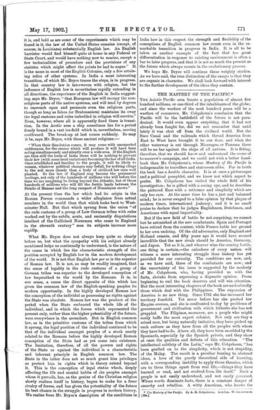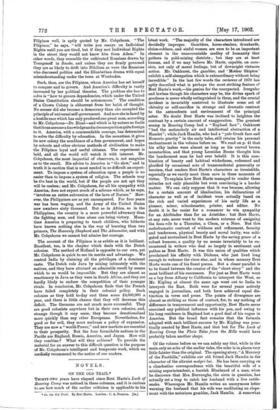THE MASTERY OF THE PACIFIC.*
THE Asiatic Pacific area boasts a population of almost five hundred millions, or one-third of the inhabitants of the globe ; and since the warfare of the next hundred years will be a warfare of commerce, Mr. Colquhoun's conclusion that the Pacific will be the battlefield of the future is not para- doxical. It would even appear surprising that it had not already been fought for, did we not remember that until lately it was shut off from the civilised world. But the Suez Canal and the railroads which thread America from East to West have brought it to our door, and when the other waterway is cut through Nicaragua or Panama there will be no bar against the ships of all nations. It is fitting, therefore, that we should know and understand the scene of to-morrow's campaign, and we could not wish a better hand- book than Mr. Colquhoun's, whose Mastery of the Pacific is indispensable to travellers and statesmen alike. For in truth the book has a double character. It is at once a picturesque and a political pamphlet, and we know not which aspect to prefer. Mr. Colquhoun has visited the whole field of his investigation ; he is gifted with a seeing eye, and he describes the pictured East with a reticence and simplicity which are only too rare. At the same time he has a just and balanced mind; he is never swayed to a false opinion by that plague of modern times, international jealousy; and it is no small praise to declare that he judges Englishmen, Dutchmen, and Americans with equal impartiality.
But if the new field of battle be not surprising, we cannot but be astonished at the new combatants. Spain and Portugal have retired from the contest, while France holds her ground to her own undoing. Of the old adversaries, only England and Holland remain, and fifty years ago it would have seemed incredible that the new rivals should be America, Germany, and Japan. Yet so it is, and whoever wins the coming battle, one thing is certain,—the onlookers of every nation will witness a more interesting struggle than history has yet provided for our curiosity. The conditions are new, and, as we have said, three of the combatants are new; and the uncertainty of the issue is suggested by the modesty of Mr. Colquhoun, who, having provided us with the facts, shrinks from expressing a dogmatic opinion. From beginning to end the book deserves and will win attention. But the most interesting chapters of the book are undoubtedly those which deal with the Philippines. The expansion of America is no new thing. Since 1782 she has increased her territory fourfold. Yet never before has she pushed her Empire oversea, and she is confronted to-day by problems of government and civilisation with which hitherto she has not grappled. The Filipinos, moreover, are a people who might easily baffle the most expert colonist. Not only are they a mixed race, but being naturally imitative, they have picked up such culture as they have from all the peoples with whom they have had to do. Above all, they have been moulded by the Spaniards, especially by the Spanish priests, and they show at once the qualities and defects of this education. "The intellectual subtlety of the Latin," says Mr. Colquhoun, " has been grafted on to the simplicity, which is not stupidity, of the Malay. The result is a peculiar leaning to abstract ideas, a love of the purely theoretical side of learning, with a corresponding inability to apply these theories, which are to them things apart from real life,—things they have learned or read, and not evolved from life itself." Such a people is not easily understood, and not easily governed. Where words dominate facts, there is a constant danger of anarchy and rebellion. A witty American, who knows the • The Mastery of the Pacibile. By A. B. Colquhoun. London : W. Hoinaniann. gaga
Filipinos well, is aptly quoted by Mr. Colquhoun. " The Filipinos," lie says, " will write you essays on Individual Rights until you are tired, but if they met Individual Rights in the street they would not know him from Adam." In other words, they resemble the cultivated Russians drawn by Tourgeneff in Smoke, and unless they are firmly governed they are as likely to drift into Nihilism as were the Russians who discussed politics and the Elizabethan drama with equal misunderstanding under the trees at Wiesbaden.
Such, then, are the Filipinos, whom America has set herself to conquer and to govern. And America's difficulty is vastly increased by her political theories. The problem she has to solve is " how to govern dependencies, which under the United States Constitution should be autonomous." The condition of a Crown Colony is abhorrent from her habit of thought. No sooner did she become a democracy than she accepted the principle of universal self-government. And now she is faced by a hostile race which has only produced one great man, according to Mr. Colquhoun—Dr. Rizal—and which is by nature so facile that it can assume a knowledge and a circumspection quite foreign to it. America, with a commendable courage, has determined to solve the difficulty by education. In the meantime, it gives its new colony the semblance of a free government, and hopes by schools and other obvious methods of civilisation to make the Filipinos loyal and useful citizens. The experiment is bold, and all the world will watch it with interest. Mr. Colquhoun, the most impartial of observers, is not sanguine as to the result. His advice to America is " Go slow," and in truth it is caution that is most needed in so difficult an experi- ment. To impose a system of education upon a people is no easier than to impose a system of religion. The schools may be tl•e best in the world, but if the people are not apt they will be useless; and Mr. Colquhoun, for all his sympathy with America, does not expect much of a scheme which, as he says, "involves an entire subversion of the laws of Nature." How- ever, the Philippines are as yet unconquered. For four years war has been waging, and the Army of the United States now numbers sixty thousand. But as in Africa, so in the Philippines, the country is a more powerful adversary than the fighting men, and time alone can bring victory. Mean- time America is preparing to teach children, who hitherto have known nothing else in the way of learning than two primers, The Heavenly Shepherd and The Admonitor, and with Mr. Colquhoun we cannot but admire her courage.
The account of the Filipinos is as subtle as it is brilliant. Excellent, too, is the chapter which deals with the Dutch colonies. The method of Holland is opposite to our own, yet Mr. Colquhoun is quick to see its merits and advantage. We control India by claiming all the privileges of a dominant caste. The Dutch rule Java by mixing intimately with the natives, and they have attained an admirable result by means which to us would be impossible. But they are almost as reactionary in Java as they were in South Africa, and they are hardly likely to endure the competition of their younger rivals. In conclusion, Mr. Colquhoun finds that the French have failed completely in their colonial policy. Such colonies as they hold to-day cost them some £4,000,000 a year, and there is little chance that they will decrease this deficit. The Germans are not much more successful. They are good colonists anywhere but in their own colonies, and, strange though it may seem, they become denationalised more quickly than any other Europeans. Nevertheless, for good or for evil, they must embrace a policy of expansion. They are now a "world-Power," and new markets are essential to their prosperity. But the four formidable nations in the Pacific are England, Russia, America, and Japan. How will they combine ? What will they achieve ? To provide the material for an answer to this difficult question is the purpose of Mr. Colquhoun's intelligent and temperate work, which we cordially recommend to the notice of our readers.







































 Previous page
Previous page